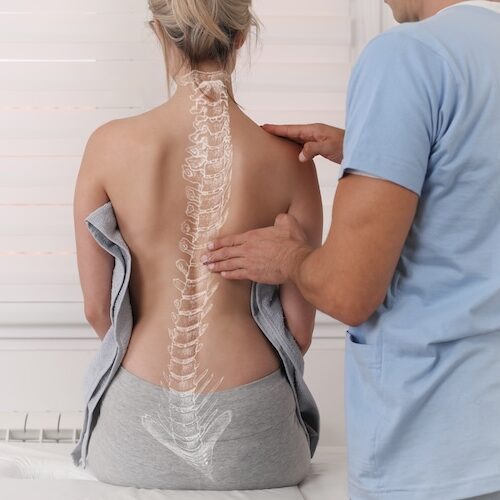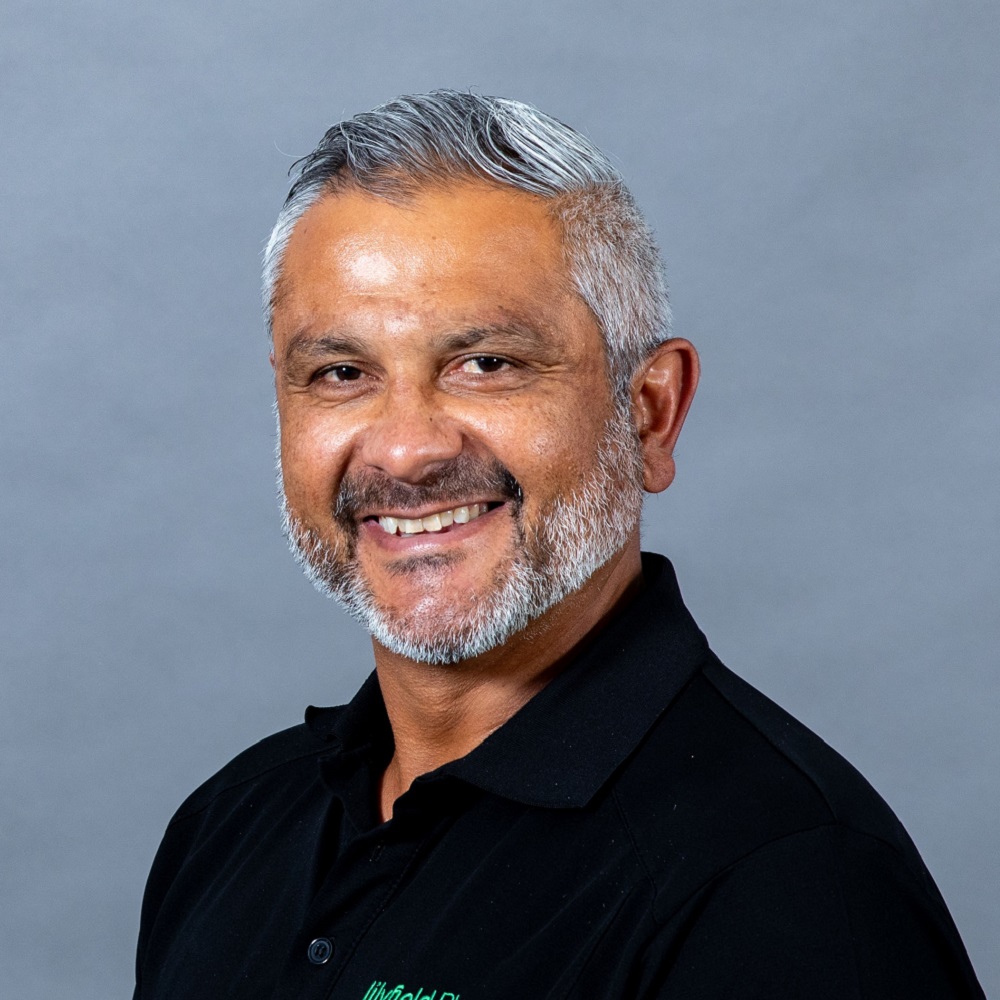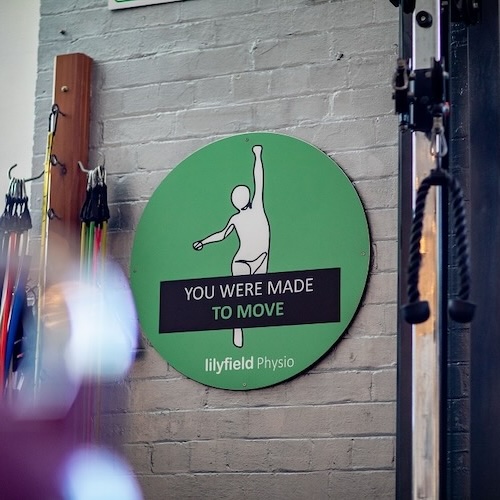Book a Physio for Scoliosis
Our scoliosis physio services in Sydney are led by Kam Bhabra (former physiotherapist to Arsenal FC and PGA Tour athletes with extensive spinal injury knowledge), and Karen Westcott (Principal Physiotherapist with expertise in biomechanics, Clinical Pilates, and spinal rehabilitation).
They are supported by Niamh Davies, who brings a strong background in rehabilitation and movement retraining, and Angel Nang, an Accredited Exercise Physiologist who specialises in strength-based conditioning and holistic care for people managing long-term conditions.
With decades of combined experience, we provide scoliosis treatment that’s tailored, progressive, and centred around your goals.
You’ll find us at:
- Mon – Tue: 7:00 AM – 7:00 PM
- Wed: 7:00 AM – 7:30 PM
- Thu: 7:00 AM – 6:00 PM
- Fri: 7:00 AM – 4:00 PM
- Sat: 8:00 AM – 1:00 PM
- Sun: Closed

How We Treat Scoliosis
Through a combination of pain management techniques, targeted strengthening, and exercise therapy, we help you achieve lasting recovery.
- Symptoms: Uneven shoulders or hips, spinal curve, rib prominence, possible back ache.
- Causes: Unknown in most cases, though growth spurts during adolescence are a key factor.
- Treatment: Posture retraining, corrective exercise programs, Pilates-based strengthening, education for self-management.
- Recovery Timeline: Ongoing management through growth years, with improvements in control and posture typically seen within weeks to months.
- Symptoms: Back pain, stiffness, visible spinal curve, nerve irritation causing leg pain or weakness.
- Causes: Age-related disc and joint changes, arthritis, previous spinal injuries.
- Treatment: Pain management, core and trunk strengthening, manual therapy, tailored exercise to improve mobility.
- Recovery Timeline: Pain relief within 2–4 weeks, strength and postural improvements over 8–12 weeks.
- Symptoms: Curvature associated with neurological or muscular conditions, reduced spinal stability.
- Causes: Conditions like cerebral palsy, muscular dystrophy, or spinal injury.
- Treatment: Supportive physiotherapy, exercise therapy to maximise function, collaboration with medical specialists.
- Recovery Timeline: Long-term management with a focus on functional improvements and comfort.
- Symptoms: Spinal curve visible from birth or early childhood, uneven shoulders or hips, possible rib cage prominence, may worsen as the child grows.
- Causes: Abnormal vertebral development during foetal growth leading to malformed or fused vertebrae.
- Treatment: Ongoing monitoring in childhood, physiotherapy for posture and mobility, strengthening to support spinal stability, collaboration with paediatric specialists.
- Recovery Timeline: Long-term management; physiotherapy aims to optimise movement and function rather than “correct” the curve.
- Symptoms: New spinal curvature following an accident, fracture, or spinal surgery; pain, stiffness, possible nerve symptoms.
- Causes: Spinal injury, vertebral fracture, or structural change post-surgery altering alignment and stability.
- Treatment: Pain management, core and spinal stabilisation exercises, manual therapy for stiffness, exercise rehabilitation to restore balance and strength.
- Recovery Timeline: Initial symptom improvement often within 4–6 weeks; full rehabilitation and functional recovery may take 3–6 months depending on the severity of the trauma or surgery.
Initial Consultation: $160
Review Assessment and Consultation: $155
Standard Consultation: $125
Please note: A cancellation fee of $83 applies for cancellations within 24 hours of the scheduled appointment. Private health rebate applicable.
Ongoing Rehab & Exercise Classes for Scoliosis
In addition to one-on-one physiotherapy, Lilyfield Physio offers group rehab and exercise classes designed to support your long-term health. These classes focus on building strength, improving mobility, correcting movement patterns, and maintaining joint resilience.
With a wide range of class types and convenient times, there’s plenty of opportunity to continue progressing safely under expert guidance.
Ready to Manage Your Scoliosis With Confidence?
Scoliosis doesn’t have to limit your movement or lifestyle. At Lilyfield Physio, we’ll guide you with safe, effective treatment plans that improve posture, reduce pain, and support your daily function.
Book your scoliosis physio appointment in Sydney today and take the next step toward a stronger, healthier spine.

Our Approach to Scoliosis Physio
- Comprehensive Assessment: Posture and movement analysis, strength and flexibility testing, and referral for X-rays if required.
- Manual Therapy: Gentle spinal mobilisation, soft-tissue release, and pain-relief techniques.
- Corrective Exercise: Tailored programs focusing on postural correction, spinal stability, and functional strength.
- Clinical Pilates: Targeted core and alignment training under physiotherapist supervision.
- Education: Guidance on daily movement, ergonomics, and strategies to minimise curve progression.
- Progress Review: Regular monitoring to adjust programs and ensure long-term results.
What Causes Scoliosis?
- Adolescent idiopathic scoliosis: Most common type, usually detected during growth spurts in adolescence. Exact cause is unknown but linked to growth and sometimes family history.
- Degenerative scoliosis: Age-related spinal changes such as arthritis, osteoporosis, or disc degeneration causing curvature later in life.
- Neuromuscular scoliosis: Associated with conditions like cerebral palsy, muscular dystrophy, or spinal cord injury, where muscle weakness or imbalance leads to spinal curvature.
- Congenital scoliosis: Present from birth due to abnormal development of the vertebrae during foetal growth.
- Trauma or surgery-related scoliosis: Previous spinal injuries, fractures, or surgical procedures can alter spinal alignment.
- Lifestyle and postural factors: While not a direct cause, poor posture, lack of strength, or imbalanced activity can worsen symptoms in those with scoliosis.
- Family history and genetic factors: Scoliosis often runs in families, suggesting hereditary links.

Meet Our Scoliosis Physios
Lilyfield Physiotherapy is proud to offer some of Australia’s most experienced and highly qualified scoliosis physiotherapists, committed to helping you move better, faster.
FAQs
Scoliosis is a condition where the spine curves sideways, often forming an “S” or “C” shape. It can develop in childhood, adolescence, or adulthood and may cause uneven posture, stiffness, or pain.
Scoliosis physio is specialised physiotherapy that helps manage spinal curvature by reducing pain, improving posture, and strengthening muscles to support the spine.
Physiotherapy cannot reverse the spinal curve, but it can significantly reduce symptoms, improve alignment, slow progression, and enhance overall quality of life.
If you have back pain, uneven shoulders or hips, visible curvature, or a scoliosis diagnosis, physiotherapy can help manage your condition.
Yes. Early physiotherapy can improve posture, strength, and confidence in adolescents, helping to minimise curve progression during growth spurts.
No. Treatment is tailored to your needs and usually involves gentle manual therapy and progressive exercises that should not cause pain.
Most people will require an X-ray to confirm diagnosis and measure the spinal curve. Your physio can advise if imaging is necessary.
Many patients notice improvements in posture, strength, and comfort within a few sessions. Long-term management is often recommended for lasting results.
If you have private health cover and subscribe to the “extras” cover, you may be eligible to claim part of your treatment fee. There are many different schemes and you are best advised to check your level of cover with your insurer. Most health funds are online with HICAPS, which allows you to claim your health fund rebate immediately at our clinic, leaving only the gap for you to pay. You will need to bring your health fund card with you.
Yes, in some cases. Medicare now offers chronic disease management referred to as Enhanced Primary Care (EPC) plans, for people with chronic conditions. This allows for a Medicare rebate, for up to 5 physio or exercise physiology treatments a year. You must be referred by your GP and you need to bring your Medicare card with you. If you have any queries regarding this service, please don’t hesitate to speak with our staff or discuss your eligibility with your GP.
Following a comprehensive assessment, including functional testing and physical examination, we shall establish a preliminary diagnosis and discuss your treatment options and expected outcomes with you.
Treatment may involve different options for relieving pain, restoring function, flexibility and strength.
You will learn techniques to use at home to manage your problem, which may include preventative measures and exercise.
During your consultation, please feel free to ask ass any questions as you wish. A good understanding of your condition is important for your recovery. This includes your likely recovery time, number of sessions required and future exercise advice.
We may liaise with others involved in your care., If applicable, we shall also refer you onto other health professionals to play a role in your recovery.
You are welcome to wear whatever you are most comfortable in. For Exercise sessions and classes, please wear exercise clothes and a pair of socks, making sure you able to move freely
Please bring along any doctor’s referral letters, scan or x-ray results and your private health insurance card so you can claim for your treatment on the spot.
Your Physiotherapist will complete a thorough assessment of your complaint and then provide you with a preliminary diagnosis and appropriate treatments based on their findings. This will generally consist of some hands-on treatment, advice and often you will receive some exercises to do at home. Your Physiotherapist will also discuss with you their plan for management which will include likely recovery time, number of sessions required and future exercise advice.
We accept cash, EFTPOS, VISA and MasterCard. If you bring your private health insurance card with you, we can process an on-the-spot claim via our HICAPS terminal and you will then only need to pay the gap fee.
Yes. Physiotherapists can refer patients directly for MRI scans, provided they have completed the appropriate training and accreditation. Your physiotherapist will determine if an MRI is necessary based on your assessment and condition.
Yes. Physiotherapists can provide medical certificates (sick notes) for issues related to musculoskeletal or physical health concerns. These certificates can cover time off work, recommendations for modified duties, or clearance for returning to regular activities.
We accept referrals for Compulsory Third-Party Insurance claims. Once you have seen your GP and received a claim number, we are able to send any invoices directly to the insurer. If you need to start treatment before you have a claim number, we shall ask you to cover the cost of the treatment and claim from the insurer later.
You can cancel and re-schedule by calling our rooms on 9810 2203. For after hours, we have an answering machine service for you to leave a message. Our receptionist will contact you shortly after it is received to confirm cancellation or to help you re-schedule.
We request that if you are unable to make a consultation or class that you let us know at least 24 hours prior to your appointment so that someone else can use your treatment time.
We have a cancellation fee policy for late cancellations or missed appointments.
This practice takes great care to ensure that our information records are accurate and are treated with full regard to the privacy of our patients. We only collect information from our patients that is necessary for good health care and aim to ensure that any information we hold is accurate, complete and up-to-date.
The health information we hold helps us provide our patients with the best possible health care, and is disclosed only to others involved in your treatment, such as your doctor. If we need to disclose information about you to people other than those associated with your treatment, we will seek your permission first.
Occasionally we may be involved in research on health issues. If any data from this practice is used in research, it will not include information which identifies our patients.
This practice is bound by the Privacy Amendment (Private Sector) Act 2000, and operates in accordance with the Code of Conduct of the Australian Physiotherapy Association. If you would like to discuss any aspects of our privacy policy, or review your health records, please advise your treating Physiotherapist or Exercise Physiologist.












